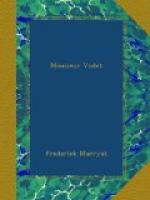“And afterwards, again, more of our children left us. By that time they left us because we were angry. They were few families of chiefs who had grown strong and proud. They wished to lord over our wigwams, and we drove them away, as the panther drives away her cubs, when their claws and teeth have been once turned against her. These are the Arrapahoes They are strong and our enemies, yet they are a noble nation. I have in my lodge twenty of their scalps; they have many ours. They fight by the broad light of the day, with the lane bow, and arrows; they scorn treachery. Are they not although rebels and unnatural children, still the children, of the Shoshones? Who ever heard of the Arrapahoes entering the war-path in night? No one! They are no Crows, no Umbiquas, no Flat-heads! They can give death; they know how to receive it,—straight and upright, knee to knee, breast to breast, and their eye drinking the glance of their foe.
“Well, these Arrapahoes are our neighbours; often, very often, too much so (as many of our widows can say), when they unbury their tomahawk and enter the war-path against the Shoshones. Why; can two suns light the same prairie, or two male eagles cover the same nest? No. Yet numerous stars appear during night, all joined together, and obedient to the moon. Blackbirds and parrots will unite their numerous tribes and take the same flight to seek altogether a common rest a shelter for a night; it is a law of nature. The Red-skin knows none but the laws of nature. The Shoshone is an eagle on the hills, a bright sun in the prairie, so is an Arrapahoe; they must both struggle and fight till one sun is thrown into darkness, or one eagle, blind and winged, falls down the rocks and leaves the whole nest to its conqueror. The Arrapahoes would not fight a cowardly Crow, except for self-defence, for he smells of carrion; nor would a Shoshone.
“Crows, Umbiquas, and Flat-heads, Cayuses, Bonnaxes, and Callapoos can hunt all together and rest together; they are the blackbirds and the parrots; they must do so, else the eagle should destroy them during the day, or the hedgehog during the night.
“Now, Owato Wanisha, or his Manitou, has offered a bold thing. I have thought of it, I have spoken of it to the spirits of the Red-skin; they said it was good; I say it is good! I am a chief of many winters; I know what is good, I know what is bad! Shoshones, hear me! my voice is weak, come nearer; hearken to my words, hist! I hear a whisper under the ripples of the water, I hear it in the waving of the grass, I feel it on the breeze!—hist, it is the whisper of the Master of Life,—hist!”
At this moment the venerable chief appeared abstracted, his face flushed; then followed a trance, as if he were communing with some invisible spirit. Intensely and silently did the warriors watch the struggles of his noble features; the time had come in which the minds of the Shoshones were freed of their prejudices, and dared to contemplate the prospective of a future general domination over the Western continent of America. The old chief raised his hand, and he spoke again:—




